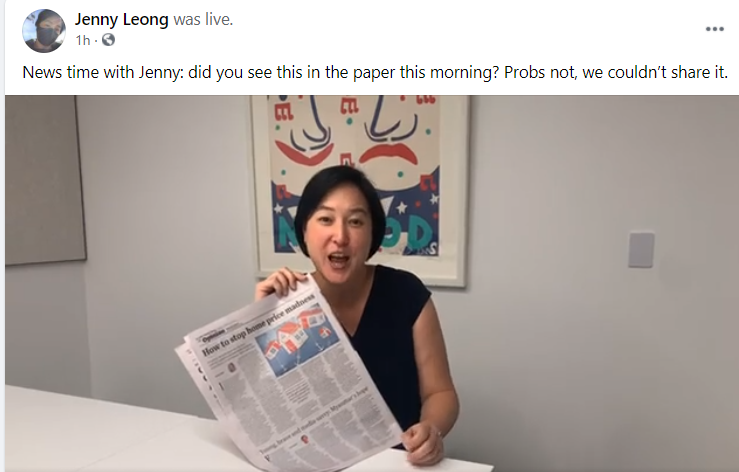استيقظ مستخدمو فيسبوك في أستراليا، صباح اليوم الأربعاء، على "فيسبوك دون أخبار"؛ حيث قررت شركة فيسبوك منع مستخدميها في أستراليا من مشاهدة أو نشر الأخبار على منصته. القرار يشكل ذروة المعركة بينها وبين الحكومة الأسترالية وناشري الأخبار، إثر الجدل الذي أثاره مقترح قانون يطالب شركات مثل فيسبوك وغوغل بدفع تعويضات مالية للناشرين الأستراليين مقابل نشرها للمحتوى الذي تنتجه. واتهم الناشرون غوغل وفيسبوك بالاستحواذ على عوائد الإعلانات وبالتالي الإجهاز على مصادر تمويل المؤسسات الإعلامية.
شركة فيسبوك أصدرت بيانا ردت فيه على مقترح قانون المساومة الإعلامية الأسترالي Media Bargaining law"، إذ بموجبه "ستقيّد الناشرين والأشخاص في أستراليا من نشر أو مشاهدة المحتوى الإخباري الأسترالي والعالمي" مبينة، في نفس السياق، أن مقترح القانون يسيء فهم طبيعة العلاقة بين المنصة والناشرين الذين يستخدمونها لنشر محتواهم الإخباري.
قرار فيسبوك سيؤدي إلى منع مستخدمي الموقع في أستراليا من الوصول لأي محتوى إخباري أو حتى نشره على الموقع. ولم يمر القرار دون أن يثير جدلا كبيرا بين المؤسسات الصحفية الأسترالية من جهة وبين الصحفيين والمواطنين من جهة أخرى، حول تبعاته وتأثيره على الصحف وحرية تدفق الأخبار.
ينص مقترح القانون المثير للجدل على "السماح للمؤسسات الإعلامية الأسترالية بالمساومة بشكل فردي أو جماعي مع غوغل وفيسبوك على دفعها مبالغ مالية مقابل تضمين محتوى المؤسسات الإعلامية الإخباري ضمن خدماتها [غوغل وفيسبوك]". كما يتضمن القانون بنودا تطلب من الشركتين أن تزود المؤسسات الإعلامية بتنبيه مسبق في حال طرأ تغيير في الخوارزميات أو طريقة عرض الأخبار وبشكل يضمن الإحالة لمصادر المحتوى الإخباري الرئيسية، وبنود أخرى تسعى لتنظيم تأثير الشركتين على حرية تدفق الأخبار في أستراليا.
موقف الناشرين الأستراليين والدعم الحكومي له يعزى بالأساس إلى انهيار عوائد المؤسسات الإعلامية من الإعلانات لصالح فيسبوك وغوغل، حيث تشير الأرقام إلى أن 80% من قيمة الإعلانات الرقمية في أستراليا تذهب فقط لغوغل وفيسبوك. بينما ترى شركة فيسبوك أن هذه الأرقام تُغفل حقيقة أن المؤسسات الإعلامية الأسترالية استفادت من فيسبوك، في العام الماضي فقط، بعوائد وصلت لقرابة 318 مليون دولار أميركي، إلا أن فيسبوك "لم يستفد شيئا بالمقابل" كما ذكر بيان للشركة الأميركية.
ما هي الصفحات التي حجبها فيسبوك اليوم؟
ولم يقتصر القرار على حجب الصفحات الإخبارية فقط، بل تعداه لحجب صفحات حكومية رئيسية مثل صفحات للخدمات الصحية والطوارئ وكذلك صفحات الشرطة وبعض الصفحات الرسمية للوزارات. حزمة الإجراءات التي باشرتها شركة فيسبوك، كانت محط استنكار واسع بسبب "الاستهتار" بأهمية هذه الصفحات في مرحلة صحية حرجة يشهدها العالم مطبوعة بتفشي فيروس كوفيد – 19 رغم أنها (الصفحات) لا تكتسي أي صبغة إخبارية.
لقد علق رئيس الوزراء الأسترالي، سكوت موريسون، على "حرب" فيسبوك قائلا: "إن حجب الوصول للمعلومات المتعلقة الخدمات الصحية الرئيسية وخدمات الطوارئ كان قرارا متعجرفا بقدر ما هو مُحبط".
مستوى التصعيد من لدن فيسبوك، لم يكتف بحجب المحتوى الإخباري عن المستخدمين في أستراليا، إنما امتد لحجب محتوى صفحات الأخبار الأسترالية عن باقي العالم، أي أنه عزل كامل الصفحات الإخبارية الأسترالية من الوصول لأي جمهور على فيسبوك على الإطلاق.

"غوغل" تقدّم تنازلات
وكانت شركة غوغل؛ قد اقترحت بعض المساومات مقابل الوصول لصيغة تسوية مع الحكومة والناشرين الأستراليين؛ حيث أعلنت قبل أشهر عزمها إطلاق منصة جديدة (Google News Showcase) تجمع أكثر من 7 ناشرين يمثلون قرابة 21 مؤسسة إخبارية أسترالية. وستضمن المنصة الجديدة تحقيق عوائد للمؤسسات الإعلامية من خلال عرض أخبارهم عليها، كما قالت شركة غوغل إن المؤسسات الإعلامية التي انضمت للمنصة ستستفيد من عوائد مادية كبيرة مقابل مشاركة محتواها الإخباري في المنصة.
"إمبراطور" الإعلام الأميركي، الأسترالي المولد، روبرت موردوخ؛ أعلن قبل ساعات أن شركته News Corp التي تضم عشرات المؤسسات الإعلامية والقنوات والصحف حول العالم، ومن ضمنها ثلاثة من كبريات الصحف الأسترالية؛ ستنضم لمنصة غوغل الجديدة وتتوقع أن تتلقى عوائد مالية "ضخمة".
طرق مبتكرة للاحتجاج على الحجب
وكردة فعل ساخرة للالتفاف على قرار حجب نشر الاخبار عن مستخدمي فيسبوك في أستراليا، قامت عضو في البرلمان ببث حي على فيسبوك. ظهرت النائبة، وهي تحمل عدد اليوم من إحدى الصحف الأسترالية، وبدأت بقراءة الأخبار التي وردت فيها، حيث كتبت: "هل رأيتم هذا الخبر في الصحف هذا الصباح؟ على الأغلب لا لأننا لم نستطع مشاركته" في إشارة إلى قرار الحجب.







































